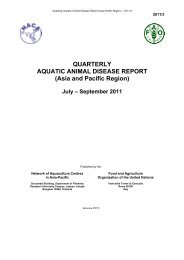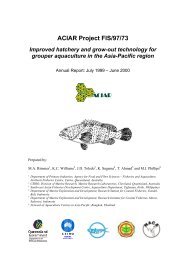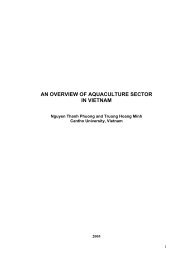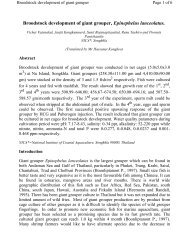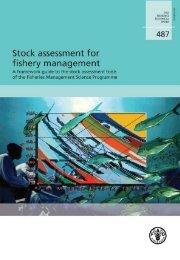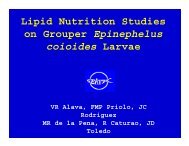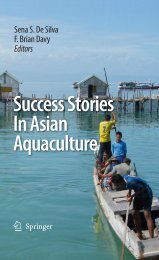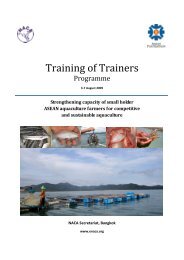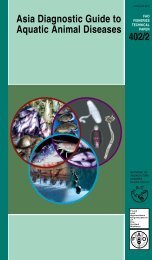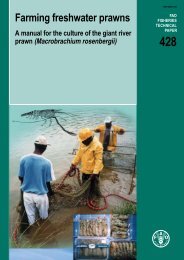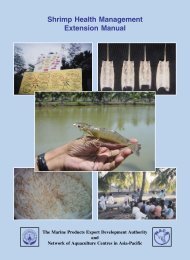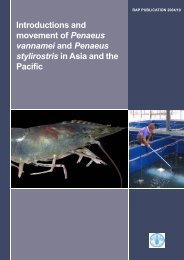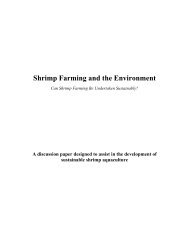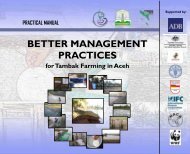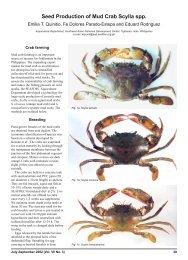Excerpt from the Terminal Report on the NACA Project1 - Library
Excerpt from the Terminal Report on the NACA Project1 - Library
Excerpt from the Terminal Report on the NACA Project1 - Library
You also want an ePaper? Increase the reach of your titles
YUMPU automatically turns print PDFs into web optimized ePapers that Google loves.
providing <str<strong>on</strong>g>the</str<strong>on</strong>g>m with a better appreciati<strong>on</strong> of <str<strong>on</strong>g>the</str<strong>on</strong>g> multidisciplinary approach to aquaculture<br />
development planning.<br />
Ano<str<strong>on</strong>g>the</str<strong>on</strong>g>r approach adopted by <str<strong>on</strong>g>the</str<strong>on</strong>g> project was to transfer well-developed traditi<strong>on</strong>al<br />
technologies in any country of <str<strong>on</strong>g>the</str<strong>on</strong>g> regi<strong>on</strong> to o<str<strong>on</strong>g>the</str<strong>on</strong>g>r countries. One such technology<br />
selected for regular training was integrated fish-livestock-crop farming, a technology<br />
developed in China through many years of practical experience. This technology was felt<br />
to be eminently suitable to extend to countries <str<strong>on</strong>g>the</str<strong>on</strong>g> additi<strong>on</strong>al sources of employment<br />
needed in rural areas. In additi<strong>on</strong>, to increase <str<strong>on</strong>g>the</str<strong>on</strong>g> variety of food crops and effectively<br />
utilizing wastes <str<strong>on</strong>g>from</str<strong>on</strong>g> agriculture and ancillary industries, this mixed farming system can<br />
also c<strong>on</strong>tribute to overall integrated rural development.<br />
See Attachment 2 for <str<strong>on</strong>g>the</str<strong>on</strong>g> descripti<strong>on</strong> of <str<strong>on</strong>g>the</str<strong>on</strong>g> courses and workshops.<br />
The manpower development programme under <strong>NACA</strong> focused <strong>on</strong> aquaculture<br />
development planning and project implementati<strong>on</strong>, producti<strong>on</strong> skills, and transfer of<br />
known and improved technology for direct applicati<strong>on</strong> in nati<strong>on</strong>al producti<strong>on</strong><br />
programmes.<br />
From 1981 to 1989, 16 sessi<strong>on</strong>s of two regular training courses were organized al<strong>on</strong>g<br />
with nine short courses and two workshops. One of <str<strong>on</strong>g>the</str<strong>on</strong>g> two regular courses was <str<strong>on</strong>g>the</str<strong>on</strong>g> <strong>on</strong>eyear<br />
postgraduate, broad-based and multidisciplinary training programme for senior<br />
technical pers<strong>on</strong>nel involved in planning and implementing nati<strong>on</strong>al aquaculture<br />
development projects. The RLCP training course was held seven times and 137 Senior<br />
Aquaculturists <str<strong>on</strong>g>from</str<strong>on</strong>g> 20 countries graduated. The RLCC four-m<strong>on</strong>th training course <strong>on</strong><br />
integrated fish farming was of special importance to rural development in developing<br />
countries as it showed how farm resources can be used efficiently and helped generate<br />
more rural employment. The course was organized nine times at RLCC and 207 Senior<br />
Aquaculture Pers<strong>on</strong>nel <str<strong>on</strong>g>from</str<strong>on</strong>g> 36 countries graduated.<br />
Nine short courses and two workshops were organized in resp<strong>on</strong>se to <str<strong>on</strong>g>the</str<strong>on</strong>g> needs of <str<strong>on</strong>g>the</str<strong>on</strong>g><br />
governments. The nine-m<strong>on</strong>th postgraduate course <strong>on</strong> fish disease diagnosis and<br />
tropical fish health management c<strong>on</strong>ducted at <str<strong>on</strong>g>the</str<strong>on</strong>g> Universiti Pertanian Malaysia was held<br />
in 1988–89. The sec<strong>on</strong>dment programme of junior scientists for <strong>on</strong>e-year practical<br />
attachment and participati<strong>on</strong> in <str<strong>on</strong>g>the</str<strong>on</strong>g> research programmes of <str<strong>on</strong>g>the</str<strong>on</strong>g> RLCs was a costeffective<br />
and relatively rapid method of upgrading research pers<strong>on</strong>nel in <str<strong>on</strong>g>the</str<strong>on</strong>g> centres.<br />
Overall, <str<strong>on</strong>g>the</str<strong>on</strong>g> training programme fortified <str<strong>on</strong>g>the</str<strong>on</strong>g> manpower base for technology<br />
development, enhanced regi<strong>on</strong>al cooperati<strong>on</strong> in aquaculture development through <str<strong>on</strong>g>the</str<strong>on</strong>g><br />
streng<str<strong>on</strong>g>the</str<strong>on</strong>g>ning of <str<strong>on</strong>g>the</str<strong>on</strong>g> human network, and helped aquaculture attain a higher priority in<br />
nati<strong>on</strong>al planning and policy formulati<strong>on</strong>. The latter was a result of many of <str<strong>on</strong>g>the</str<strong>on</strong>g> <strong>NACA</strong><br />
alumni, particularly of <str<strong>on</strong>g>the</str<strong>on</strong>g> Senior Aquaculturists and <str<strong>on</strong>g>the</str<strong>on</strong>g> Integrated Fish Farming<br />
courses, being subsequently promoted to strategic positi<strong>on</strong>s in <str<strong>on</strong>g>the</str<strong>on</strong>g>ir governments, as<br />
feedback <str<strong>on</strong>g>from</str<strong>on</strong>g> former trainees has shown.<br />
c. AQUACULTURE INFORMATION SYSTEM (AQUIS)<br />
Related to <str<strong>on</strong>g>the</str<strong>on</strong>g> strategy of project implementati<strong>on</strong>, <str<strong>on</strong>g>the</str<strong>on</strong>g> informati<strong>on</strong> comp<strong>on</strong>ent was<br />
designed to serve aquaculture producti<strong>on</strong> needs. Complementing <str<strong>on</strong>g>the</str<strong>on</strong>g> training and<br />
technology transfer activities, it c<strong>on</strong>sisted of publicati<strong>on</strong>s, audio-visuals, and a computerbased<br />
aquaculture informati<strong>on</strong> system called AQUIS. Besides <str<strong>on</strong>g>the</str<strong>on</strong>g> quarterly <strong>NACA</strong><br />
Newsletter, more than 90 working papers and seven technical publicati<strong>on</strong>s in <str<strong>on</strong>g>the</str<strong>on</strong>g> World<br />
Food Day Series were produced, including ‘Integrated Fish Farming in China’, a book<br />
developed by <str<strong>on</strong>g>the</str<strong>on</strong>g> RLC in China for <str<strong>on</strong>g>the</str<strong>on</strong>g> regular training course <strong>on</strong> integrated fish farming.<br />
These were disseminated to <str<strong>on</strong>g>the</str<strong>on</strong>g> governments and centres, as well as o<str<strong>on</strong>g>the</str<strong>on</strong>g>r collaborative<br />
instituti<strong>on</strong>s, organizati<strong>on</strong>s and agencies.



